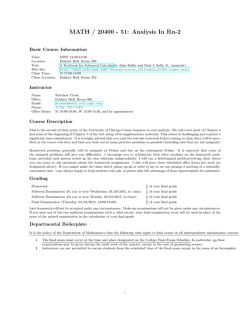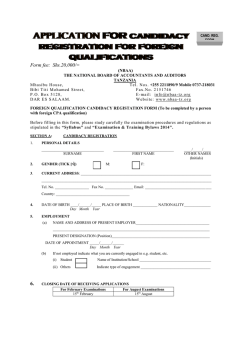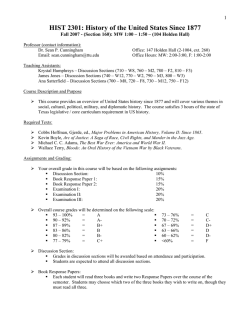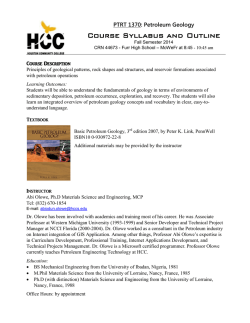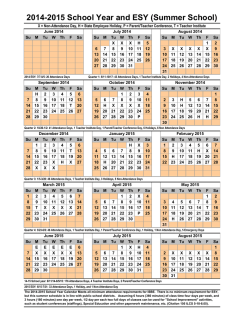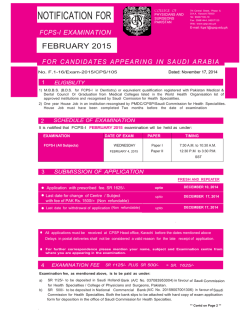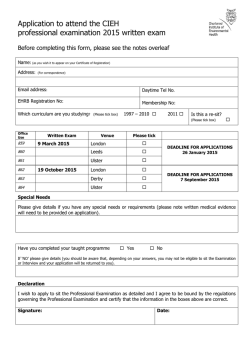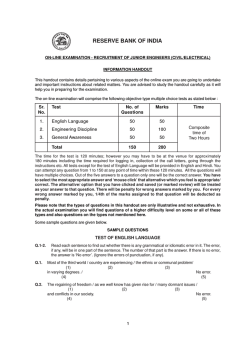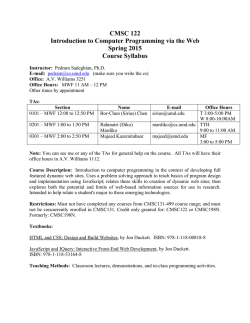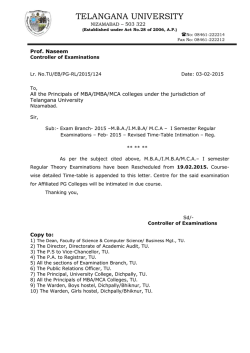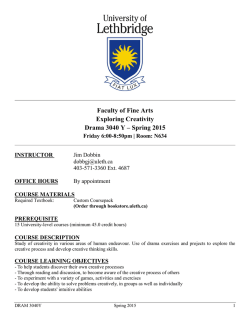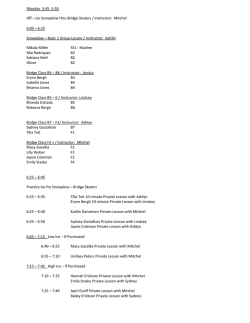
HISTORY 1302 - HCC Learning Web
HISTORY 1302 UNITED STATES HISTORY AFTER 1877 Spring 2013 CRN 34542 Saturday, 9 A.M. – 12 P.M., Room C252, West Loop Center INSTRUCTOR: Adjunct Professor C. R. Ritchie TELEPHONE: 281-414-0854 (cell phone) E-MAIL: [email protected] COURSE DESCRIPTION History 1302 is a survey of American history from 1877 to as near to the present as possible. It will focus on the economic, social/cultural and political institutions which have defined the development of the modern United States and its people. Although this course is built around historical events and processes, it is much more than a simple recitation of facts. History 1302 is a 16-week 48 contract-hour course which fulfills three hours of the statemandated six-hour history requirement. Completion of this class will also improve performance in reading, writing, critical thinking, communicating, and computer skills. Prerequisites: Must be placed into college-level reading and college-level writing. COURSE OBJECTIVES 1. To provide a comprehensive introduction to the essential social/cultural, political, military and diplomatic elements of United States history after 1877. 2. To provide students with a thorough ground in problem-solving and analytical thinking, particularly as they relate to American history. 3. To provide students with training in skills essential to success in a college/university and/or work environment. PROGRAM LEARNING OUTCOMES 1. 2. 3. 4. Students will be able to create an argument through the use of historical evidence. Students will be able to analyze and interpret primary and secondary sources. Students will be able to identify proper academic, history databases. Students will be able to analyze the effects of historical, social, political, economic and cultural forces on this period in U. S. history. 5. Students will be able to understand the importance of chronology and how earlier ideas and events shaped later events. BOOKS Text (Required): Edward L. Ayers, Lewis L. Gould, David M. Oshinsky, and Jean R. Soderfund. American Passages: A History of the United States. Fourth Edition. Advantage Edition. Boston: Wadsworth, Gengage Learning, 2010. Supplementary (Select two for Summary/Reviews): Roger Daniels. Guarding the Golden Door: American Immigration Policy and Immigrants Since 1882. New York: Hill and Wang, 2004. Peter Iverson. “We Are Still Here.” American Indians in the Twentieth Century. Wheeling, Illinois: Harland Davison, Inc., 1998. Edmund Morris. Theodore Rex. New York: Modern Library Paperback Edition. 2002. Upton Sinclair. The Jungle. New York: New American Library, Signet Classics, 2001. John Morton Blum. Woodrow Wilson and the Politics of Morality. New York: HarperCollins, 1956. Doris Kearns Goodwin. No Ordinary Time. Franklin & Eleanor Roosevelt: The Home Front in World War II. New York: Touchstone, 1995. J. William T. Youngs, Eleanor Roosevelt: A Personal and Public Life. New York: Longman, Library of American Biography, 2006. Robert H. Ferrell. Harry S. Truman and the Modern American Presidency. Longman, Library of American Biography, 1983. New York: David M. Oshinsky. Polio: An American Story. The Crusade That Mobilized the Nation Against the 20th Century’s Most Feared Disease. New York: Oxford University Press, 2006. William B. Pickett. Dwight David Eisenhower and American Power. Wheeling, Illinois: Harlan Davison, Inc., 1995. Stephen B. Oates. Let the Trumpet Sound: The Life of Martin Luther King, Jr. New York: Harper Perennial, 1994. Anne Moody. Coming of Age in Mississippi: The Classic Autobiography of Growing Up Poor and Black in the Rural South. New York: Dell Publishing, 1997 Max Frankel. High Noon in the Cold War: Kennedy, Khrushchev, and the Cuban Missile Crisis. New York: Ballantine Books, 2004. 2 George C. Herring. America’s Longest War: The United States and Vietnam, 1950-1975. Fourth Edition. New York: McGraw-Hill, Inc., 2002. Jules Tygiel. Ronald Reagan and the Triumph of American Conservatism. Second Edition. Pearson Longman, Library of American Biography, 2006. GRADED ASSIGNMENTS The final course grade will be based on the following elements. Regular Examinations and Final (65%) There will be two regular examinations and a final. Review sheets will be given before each scheduled examination. All regular examinations consist of three parts: multiple-choice (20 points), identification and significance (30 points), and essay-type questions (50 points). All exams will be given numerical grades and will not be grade on curves. Regular exams will be averaged to count for 25 percent of your grade. The final, which will count for 40 percent, consists of the same parts of the regular examinations but with different allocations—10 points for multiple-choice, 30 for identification and significance, and 60 for essay-type questions. You must pass the final in order to pass the course. Required Book Summary/Reviews (25%) Each student will be required to submit two summary/reviews of the books indicated on Pages 2 and 3. This assignment will count for 25 percent of your grade. Each summary/review should be no more than five to seven double-spaced typewritten pages and should reflect your understanding of the respective work’s contents as well as your critical abilities. The first paper will be due March 23. The second paper will be due May 4. Failure to submit the required paper on time will result in a reduced grade or an F for the course. Your regular examination average can be enhanced with a third summary/review. This paper may be on one of the books listed or one of your own choosing. If the choice is the latter, then the book must be approved by the instructor. The grade received on this paper will replace the lower regular examination score. Class Participation (10%) Participation in class discussions is strongly recommended. This grade will be based on regular attendance, arriving in class on time, participation in class discussions, quality and regularity of input, ability to meet deadlines and follow directions and course requirements, and general classroom behavior. “Pop quizzes“ will be given frequently. Sometime during his lecture the instructor will unexpectedly submit a sheet of four or more questions to be answered in three to five minutes. The questions will be based on the text assignment for that day. The purpose of this exercise is to motivate the student to keep current with the reading assignments. The quiz score total will be factored into your grade based on class participation. 3 Grading will follow the usual college standards (A=100-90; B=89-80; C=79-70; D=69-69; F= below 60.) There will be no extra credit assignments. Be certain to keep up with your grade average as the semester proceeds. Do not hesitate to ask the instructor about your grade situation. No makeup examinations will be given for any reason. You are allowed to miss only one examination. Your final examination score will be counted as the score of the missed examination. This option should be exercised only in the event of an unavoidable absence. Missing another regular examination without a legitimate excuse will be counted as an absence. ATTENDANCE POLICY Regular attendance is critical to success in this course and failure to attend regularly is one of the most important reasons for lack of success. Attendance will be taken at each class. Two absences are allowed; more than that unless accompanied with legitimate excuses and documentation (for example, a note from a physician, the death of a family member, an automobile accident, jury or military reserve duty) can lead to being administratively dropped from the course. Please avoid being late. Classes will start on time. Some of the most important information in any class is given during the first five to ten minutes. Frequent tardiness is one of the most significant indicators of poor performance in college. If late, please enter the classroom as unobtrusively as possible and let the instructor know the reason for the tardiness. Failure to respect this policy is usually the biggest reason for receiving a poor participation grade. Unless there is an emergency, please do not leave class until the appropriate time and without notifying the instructor before the class begins. Failure to do so will result in being counted absent. If a class is missed, the student is nevertheless responsible for all information and assignments given during that class. Perfect attendance will be rewarded with a five-point bonus added to the final grade average. Perfect attendance means no absences of any kind, no tardiness, no leaving class until the appropriate time. Nonattendance will not necessarily result in being automatically dropped. If a student chooses to stop attending class it is his/her responsibility to formally withdraw. That can be done at the Registrar’s Office at any Southwest Campus. The last date for official withdrawal is Monday, April 1. Failure to officially withdraw by that date will result in failure of the course. International students, veterans, and those on financial aid should be fully aware of the grade and minimum hours policies affecting their situation. In particular, pay attention to the rules regarding withdrawal (“W”) from a course. Once a “W” is officially recorded it will not be changed to another grade regardless of circumstances. Twenty-Minute Break Because this class is three hours long, it is essential that there be a twenty-minute break. The instructor will begin promptly after the break. Roll may be taken shortly thereafter. Please do not risk being counted absent or tardy. 4 ACADEMIC HONESTY POLICY Plagiarism, cheating, and other forms of academic dishonesty are prohibited by HCCS policy and the rules of this class. Plagiarism is the use of the ideas or words of another person (either whole or in part) without crediting the sources and constitutes the theft of another person’s intellectual property. It is the most common form of academic dishonesty. If you are unclear as to what constitutes plagiarism, you should seek clarification before beginning an assignment. Cheating involves fraud and deception for the purpose of violating legitimate testing rules. It includes, but is not limited to, copying from another student’s test paper; using during an exam materials or resources not authorized by the instructor; collaborating with another student during a test; knowingly using, buying, selling whole or part(s) of unadministered test(s). Any questions about academic dishonesty should be referred to the Student Council section of the College System catalogue. Violations of this policy will result in automatic failure of the course and/or expulsion from HCCS. DISABILITY NOTIFICATION Any student with a documented disability (e. g., physical, learning, psychiatric, visual, hearing, etc.) who needs to arrange reasonable accommodations must contact the Disability Support Service Counselor, Dr. Becky Hauri (713-716-7909) at the beginning of the semester. The instructor is authorized to provide only the accommodations requested by the Office of Disability Support Services (DSS). Students who are requesting special test accommodations must first contact the office. SEXUAL HARASSMENT Sexual harassment is a form of sex discrimination that is not tolerated by the Houston Community College System. Any student who feels that he or she is a victim of sexual harassment has the right to seek redress of the grievance. HCCS provides procedures for reviewing and resolving such complaints through its grievance policy. HCCS NOTICE ABOUT “THREEPEATING” Students who repeat a course three or more times may soon face significant tuition/fee increases at HCCS and other Texas public colleges and universities. If you are considering course withdrawal because you are not earning passing grades, then confer with your instructor/counselor as early as possible about your student habits, reading and writing work, test-taking skills, attendance, course participation, and opportunities for tutoring and other assistance that might be available. 5 CLASS ETIQUETTE Cell phones, beepers, and such devices should be silenced before the beginning of class. Important calls must be taken outside of the classroom. No electronic devices are allowed in the classroom during examinations. Using a laptop for note taking during class is acceptable. However, please do not surf the web or send e-mails during the class lectures. Please do not bring food into the classroom. Coffee and bottled sodas are allowed. CLASS ROUTINE Lectures Lectures from a vital part of this course. Material covered will overlap, sometimes transcend, the assigned textbook; therefore, attentive and discriminating note taking is essential. Each lecture will be outlined on the class instruction board. Information which the professor writes on the board should be included in your notes. Please ask questions if you do not understand part(s) of his lecture(s). Textbook Your textbook—replete with illustrations, photographs, maps, figures and tables—contains the “bedrock” information you will need. Study it carefully as you will be responsible for all text material assigned. The Assignment Schedule (see Pages 7 & 8) includes the text material to be covered for each class. Articles and Films Newspapers and magazine articles and films are correlated with the lectures and text assignments to underscore the relevance and add dimensions to certain ideas, movements, and events covered. For articles go to the Southwest College web page. Click on “Learning Web.” On “Find a faculty member” type “Ritchie” then enter. Then click on the icon/silhouette of “Robert Ritchie.” Then click on “Articles” under “History 1302: United States After 1877, CRN 34542.” Downloading will commence and take no more than five minutes. EGLS3—EVALUATION FOR GREATER LEARNING STUDENT SURVEY SYSTEM At Houston Community College, professors believe that thoughtful student feedback is necessary to improve teaching and learning. During a designated time, you will be asked to answer a short online survey of research-based questions related to instruction. The anonymous results of the survey will be made available to your professor and division chair for continual improvement of instruction. Look for the survey as part of the Houston Community College Student System online near the end of the term. 6 ASSIGNMENT SCHEDULE (SUBJECT TO CHANGES) January 19 Introduction. January 26 Chapters 17 & 18, pp. 460-473. February 2 Chapters 18, pp. 477-483; & 19, pp. 485-497 REVIEW. February 9 Chapter 20. pp. 513-537 & 534-537. February 16 Chapter 21, pp. 539-561. REVIEW. February 23 Chapters 18, pp. 473-477; & 19, pp. 497-498 & 501-509. March 2 Chapter 20, pp. 533-534; 21, pp. 562-566; & 22 (pp. 569-591. REVIEW. March 9 EXAMINATION. Chapters 17- 22, pp. 569-591. Chapters 22, pp. 592-595; & 23. March 16 SPRING BREAK. March 23 FIRST BOOK SUMMARY/REVIEW DUE. Chapter 24 & 25. REVIEW. March 30 SPRING HOLIDAY NOTE: APRIL 1 THE LAST DAY FOR ADMINISTRATIVE/STUDENT WITHDRAWALS, 4:30 P.M. April 6 Chapter 26. REVIEW. April 13 EXAMINATION. Chapters 22, pp. 502-595, 23-26. Chapter 27. 7 ASSIGNMENT SCHEDULE (CONTINUED) (SUBJECT TO CHANGES) April 20 Chapter 28. REVIEW. April 27 SECOND BOOK SUMMARY/REVIEW DUE. Chapters 29 & 30. REVIEW. May 4 SECOND BOOK SUMMARY/REVIEW DUE. Chapters 31 & 32. REVIEW. May 11 FINAL EXAMINATION. Chapters 27 -- 32. 8
© Copyright 2026
